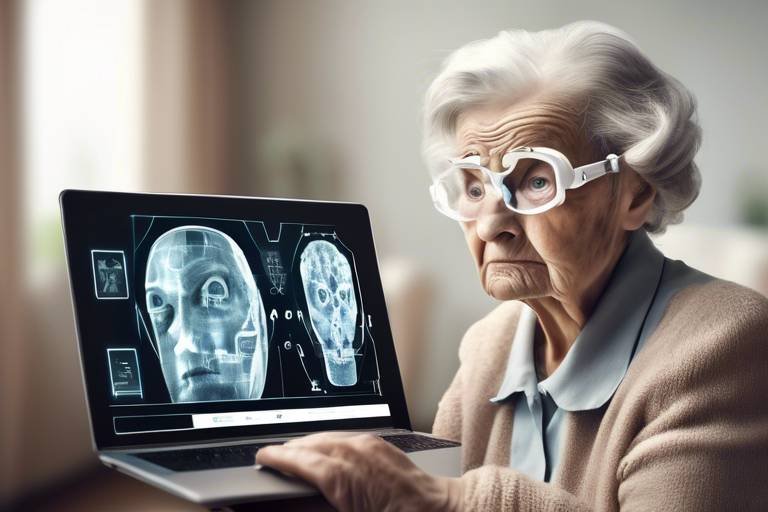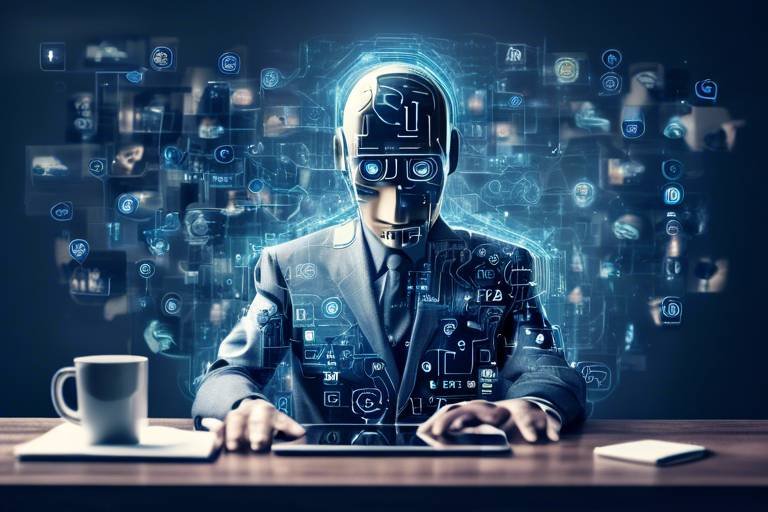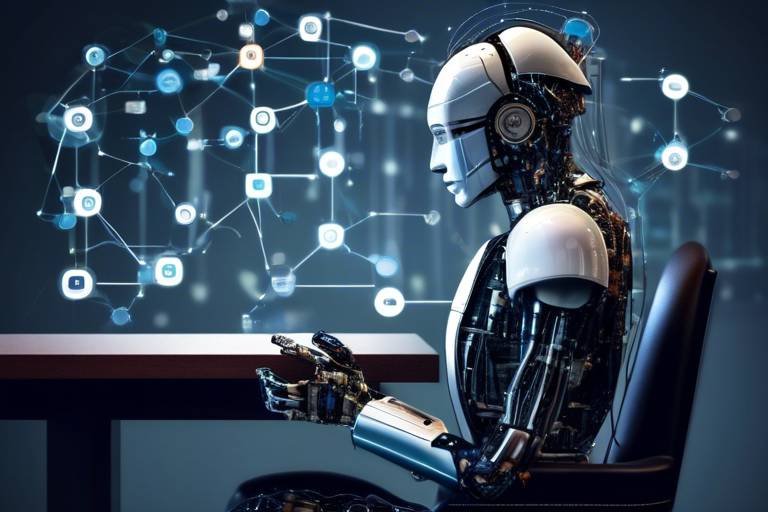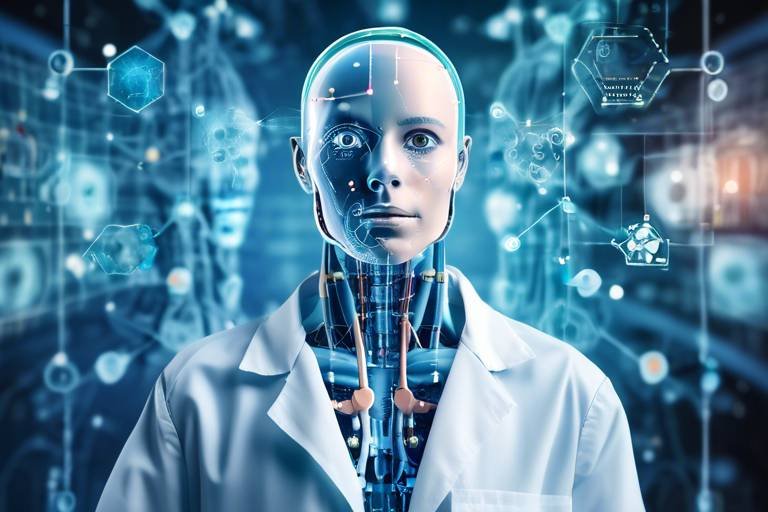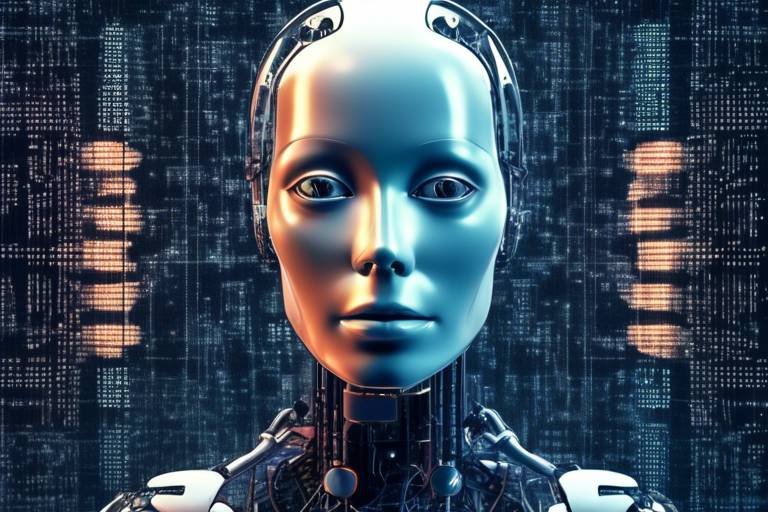A Future Look: AI Technology and Elderly Care
As we step into a new era marked by rapid technological advancements, the potential of Artificial Intelligence (AI) in transforming elderly care is nothing short of astonishing. Imagine a world where seniors can maintain their independence while receiving personalized support tailored to their unique needs. This isn't just a futuristic dream; it's becoming a reality thanks to AI technology. By integrating AI into elderly care settings, we are not only enhancing the quality of life for seniors but also empowering them to live more fulfilling lives.
The role of AI in healthcare is expanding at a breathtaking pace. From improving diagnostics to streamlining operations, AI is revolutionizing how we think about patient care. In elderly care specifically, AI technologies are being woven into the fabric of daily living, making it easier for seniors to navigate their lives with dignity and confidence. But what does this mean for the future? It means that we are on the brink of a significant shift in how we approach elderly care, with innovative solutions that promise to address the challenges faced by this demographic.
One of the most exciting aspects of AI in elderly care is its ability to provide personalized care. Think of it as having a personal assistant who knows your preferences, habits, and health conditions. AI can analyze data from various sources, such as wearable devices and health apps, to create a comprehensive picture of a senior's well-being. This enables caregivers to tailor their approach, ensuring that each individual receives the attention and support they truly need. Furthermore, the integration of AI can enhance safety measures, allowing seniors to live independently while minimizing risks associated with aging.
However, while the benefits of AI in elderly care are compelling, we must also acknowledge the challenges that come with this technological revolution. Issues such as privacy concerns and technological barriers can hinder the adoption of AI solutions. It’s crucial that we address these challenges head-on to ensure that the integration of AI is not only effective but also ethical and accessible for all seniors. As we explore the transformative role of AI in elderly care, it becomes clear that the future holds immense promise, but it requires careful consideration and collaboration among all stakeholders involved.
AI is revolutionizing healthcare by improving diagnostics, enhancing patient care, and streamlining operations. This section discusses how AI technologies are being integrated into elderly care settings.
AI offers numerous advantages for elderly individuals, including personalized care, improved safety, and enhanced communication. This section delves into specific benefits that AI brings to senior living.
Smart home devices equipped with AI can assist seniors in daily tasks, ensuring their safety and independence. This subsection explores various smart technologies that are making a difference.
Voice-activated assistants provide hands-free support for seniors, enabling them to control their environment and access information easily. This subsection discusses their impact on elderly care.
AI-powered home monitoring systems enhance safety by detecting falls or unusual behavior. This subsection examines how these systems contribute to peace of mind for both seniors and caregivers.
Wearable devices and health apps utilize AI to monitor vital signs and detect health issues early. This subsection highlights the importance of continuous health monitoring for elderly individuals.
Despite its benefits, the integration of AI in elderly care faces challenges such as privacy concerns, technological barriers, and resistance from caregivers. This section discusses these hurdles in detail.
The collection of personal data raises significant privacy and security issues. This subsection explores the implications of data management in AI systems for elderly care.
Not all seniors are tech-savvy, which can limit the effectiveness of AI solutions. This subsection addresses the need for user-friendly technology tailored to the elderly population.
- What is AI in elderly care? AI in elderly care refers to the use of artificial intelligence technologies to enhance the quality of life for seniors through personalized assistance, health monitoring, and safety measures.
- How does AI improve safety for seniors? AI improves safety through smart home technologies and monitoring systems that can detect falls, unusual behavior, and provide alerts to caregivers.
- Are there privacy concerns with AI in elderly care? Yes, the collection and management of personal data raise significant privacy and security concerns that need to be addressed to ensure ethical use of AI technologies.
- Can seniors use AI technology easily? While some seniors may face challenges due to a lack of tech-savviness, the development of user-friendly interfaces is crucial for making AI solutions accessible.

The Rise of AI in Healthcare
Artificial Intelligence (AI) is not just a buzzword; it's a game-changer in the healthcare landscape, particularly in the realm of elderly care. Imagine a world where technology doesn't just assist but actively enhances the quality of life for our senior citizens. AI is making this vision a reality by improving diagnostics, enhancing patient care, and streamlining operations. The integration of AI technologies into elderly care settings is transforming how we approach health management for the aging population.
One of the most significant impacts of AI in healthcare is its ability to process vast amounts of data quickly and accurately. For instance, AI algorithms can analyze medical records, lab results, and even genetic information to identify patterns that human clinicians might overlook. This capability leads to earlier diagnoses and more personalized treatment plans. It's like having a supercharged assistant who never tires and always has the latest information at their fingertips.
Furthermore, AI-driven tools are being developed to assist healthcare providers in making informed decisions. For example, predictive analytics can forecast potential health issues based on historical data. This proactive approach allows caregivers to intervene before a problem escalates, which is especially critical for elderly patients who may have multiple health concerns. Think of it as having a crystal ball that helps healthcare professionals anticipate and address issues before they become serious.
In addition to diagnostics and decision-making, AI is also enhancing patient care through automation and personalized experiences. For instance, AI chatbots are being utilized to provide 24/7 support to seniors, answering questions about medications, appointments, and general health inquiries. This constant availability can significantly reduce anxiety for both seniors and their families, ensuring that help is just a voice command away.
Moreover, the rise of telehealth services powered by AI is revolutionizing how elderly individuals access healthcare. With the ability to consult with doctors remotely, seniors can receive medical advice without the stress of traveling to a clinic. This is particularly beneficial for those with mobility issues or those living in remote areas. The convenience of telehealth, combined with AI's analytical capabilities, creates a more responsive and efficient healthcare system.
As we look towards the future, the potential for AI in elderly care is immense. From enhancing the accuracy of diagnoses to improving patient engagement and satisfaction, AI technologies are paving the way for a healthier, more independent lifestyle for seniors. However, it’s essential to remember that while AI can provide remarkable benefits, it must be implemented thoughtfully and ethically to ensure that it truly serves the needs of the elderly population.
| AI Applications | Benefits for Elderly Care |
|---|---|
| Predictive Analytics | Early detection of potential health issues |
| AI Chatbots | 24/7 support for health inquiries |
| Telehealth Services | Convenient access to healthcare professionals |
| Wearable Health Devices | Continuous monitoring of health metrics |

Benefits of AI for Seniors
Artificial Intelligence (AI) is not just a buzzword anymore; it's a game-changer, especially when it comes to enhancing the lives of our elderly population. Imagine a world where seniors can enjoy their golden years with greater independence, safety, and companionship. With AI stepping into the realm of elderly care, this vision is becoming a reality. The benefits are numerous and can significantly improve the quality of life for seniors, making their daily routines smoother and more enjoyable.
One of the most significant advantages of AI for seniors is the personalized care it offers. AI systems can analyze individual health data and tailor care plans to meet specific needs. For instance, if a senior has a chronic condition like diabetes, AI can help monitor their diet and medication schedules, ensuring they stay on track. This level of customization not only boosts the effectiveness of care but also empowers seniors to take charge of their health.
Improved safety is another critical benefit. With the integration of smart home technologies, seniors can live independently while being closely monitored. Smart sensors can detect falls or unusual movements, alerting caregivers or family members immediately. This feature provides peace of mind, knowing that help is just a notification away. Moreover, AI can analyze patterns in behavior, which can help predict potential health issues before they escalate. This proactive approach is akin to having a guardian angel watching over our loved ones.
Communication is vital for emotional well-being, and AI significantly enhances this aspect of elderly care. Many seniors face isolation, which can lead to feelings of loneliness and depression. AI-powered voice assistants can bridge this gap by facilitating conversations and providing companionship. Imagine a senior who can easily connect with family and friends through a simple voice command. This not only fosters social connections but also encourages mental stimulation, which is crucial for cognitive health.
To illustrate the benefits of AI for seniors, let's take a look at some specific applications:
| AI Application | Benefit |
|---|---|
| Smart Home Devices | Enhances safety and independence |
| Wearable Health Monitors | Tracks vital signs and alerts for emergencies |
| Voice-Activated Assistants | Facilitates communication and access to information |
| Home Monitoring Systems | Detects falls and unusual behavior |
In conclusion, the integration of AI into elderly care offers a plethora of benefits that can transform the lives of seniors. From personalized healthcare plans to enhanced safety and improved communication, AI is paving the way for a brighter future. As we continue to innovate and adapt technology for our aging population, the possibilities are endless. The question remains: how can we ensure that these advancements are accessible and beneficial to all seniors? The journey has just begun, and we must keep pushing forward.
- What are the main benefits of AI for seniors? AI provides personalized care, improved safety, and enhanced communication.
- How can smart home technologies assist elderly individuals? They help monitor daily activities, detect falls, and ensure safety while promoting independence.
- Are there privacy concerns associated with AI in elderly care? Yes, the collection of personal data raises significant privacy and security issues that need to be addressed.

Smart Home Technologies
When we think about the future of elderly care, are often at the forefront of innovation. These advanced systems are designed to create a safer and more comfortable living environment for seniors, allowing them to maintain their independence while receiving the support they need. Imagine a home that can respond to your every need, almost like having a personal assistant at your beck and call. This is no longer science fiction; it's reality, and it’s transforming the way we approach elderly care.
Smart home technologies encompass a wide range of devices and systems that utilize artificial intelligence to assist seniors in their daily routines. From automated lighting to temperature control, these gadgets are tailored to enhance the quality of life for elderly individuals. For instance, consider a scenario where a senior citizen wakes up in the morning, and with just a voice command, their home lights up, the coffee maker starts brewing, and the thermostat adjusts to a comfortable temperature. This level of convenience can significantly reduce the physical strain on seniors, making their day-to-day activities much more manageable.
One of the most remarkable aspects of smart home technology is its ability to promote safety. For example, smart sensors can detect unusual movements or inactivity, alerting caregivers or family members if something seems amiss. Furthermore, these systems can be programmed to remind seniors to take their medications or even call for help in case of an emergency. The peace of mind that comes from knowing that help is just a button press away cannot be overstated.
To illustrate the various components of smart home technology, let's take a look at some of the key features:
| Smart Technology | Benefits |
|---|---|
| Smart Lighting | Automatically adjusts based on time of day or motion, reducing the risk of falls. |
| Smart Thermostats | Maintains a comfortable living environment, which is crucial for health. |
| Home Security Systems | Provides real-time alerts and video surveillance, ensuring safety. |
| Voice-Activated Assistants | Enables hands-free control of devices and access to information. |
Moreover, the integration of smart home technologies is not just about convenience; it’s about empowerment. By enabling seniors to manage their own living spaces, these technologies foster a sense of control and autonomy. It can be incredibly disheartening for an elderly person to feel like they are losing their independence due to age-related challenges, but smart technologies can help bridge that gap. They offer a way to stay engaged and active in their own lives.
However, while the benefits are clear, the implementation of these technologies must be handled with care. It's crucial to ensure that the devices are user-friendly and accessible. After all, what good is a smart home if the technology is too complicated for seniors to use? This highlights the importance of designing systems with the elderly in mind, ensuring that they can easily navigate and utilize these tools without feeling overwhelmed.
In conclusion, smart home technologies are paving the way for a brighter future in elderly care. They offer a perfect blend of safety, convenience, and independence, enriching the lives of seniors and providing peace of mind for their families. As we continue to innovate and improve these systems, the potential to enhance the quality of life for elderly individuals remains vast and exciting.
- What are smart home technologies? Smart home technologies are devices and systems that use AI to automate tasks and enhance safety and comfort in the home.
- How can smart home technologies help seniors? They can assist with daily tasks, promote safety, and provide reminders for medications, thus enhancing independence.
- Are smart home devices easy to use for seniors? Yes, but it's crucial that they are designed with user-friendliness in mind to ensure accessibility for elderly users.
- What are the safety benefits of smart home technologies? They can detect falls, monitor unusual behavior, and provide real-time alerts to caregivers or family members.

Voice-Activated Assistants
Voice-activated assistants have emerged as a game-changer in the realm of elderly care, providing a level of convenience and independence that many seniors have long desired. Imagine an elderly individual, once reliant on family members for daily tasks, now having the ability to control their environment simply by speaking. This technology is not just about making life easier; it's about enhancing the quality of life for seniors, allowing them to maintain their dignity and autonomy.
These assistants, such as Amazon's Alexa, Google Assistant, and Apple's Siri, are designed to respond to voice commands, enabling seniors to perform a variety of tasks effortlessly. For instance, they can:
- Control smart home devices: Lights, thermostats, and even security systems can be operated through simple voice commands.
- Access information: Seniors can ask about the weather, news, or even recipes, keeping them informed and engaged.
- Set reminders: Voice-activated assistants can help seniors remember to take medications or attend appointments, reducing the risk of missed doses or important events.
Moreover, these assistants can facilitate communication. With just a voice command, seniors can make phone calls to family members or friends, bridging the gap between generations and combating feelings of isolation. It's like having a personal assistant who is always available, ready to help with whatever is needed.
However, the impact of voice-activated assistants goes beyond mere convenience. They also enhance safety in the home. In emergencies, seniors can call for help without needing to reach for a phone, simply by saying a command. This feature can be life-saving, providing peace of mind for both the seniors and their caregivers.
As we look to the future, the integration of voice-activated assistants into elderly care is expected to grow, becoming even more sophisticated. With advancements in AI, these systems will likely offer more personalized interactions, understanding the unique needs and preferences of each user. This evolution will not only empower seniors but also transform the way we think about aging in place.
Q1: How do voice-activated assistants help seniors with daily tasks?
A1: Voice-activated assistants can help seniors control smart devices, set reminders for medications, and access information, making daily tasks simpler and more manageable.
Q2: Are voice-activated assistants safe for seniors?
A2: Yes, they can enhance safety by allowing seniors to call for help in emergencies without needing to reach for a phone, providing peace of mind for both seniors and caregivers.
Q3: Can voice-activated assistants be customized for individual needs?
A3: Absolutely! Many voice-activated assistants can learn and adapt to the preferences of the user, making interactions more personalized and effective.

Home Monitoring Systems
Home monitoring systems are becoming a game changer in the realm of elderly care, offering a blend of technology and compassion that ensures seniors can live independently while remaining safe. Imagine a world where your loved ones can go about their daily routines without the constant worry of accidents or health emergencies. These AI-powered systems act as vigilant guardians, keeping an eye on seniors and alerting caregivers when something seems amiss. By utilizing a combination of sensors, cameras, and smart devices, home monitoring systems create a safety net that not only protects but also empowers seniors.
One of the most significant advantages of these systems is their ability to detect falls or unusual behavior. For instance, if a senior experiences a fall and is unable to call for help, the monitoring system can automatically alert caregivers or emergency services, ensuring timely assistance. This rapid response can be crucial in preventing serious injuries and providing peace of mind for both seniors and their families. The integration of AI allows these systems to learn and adapt to the senior’s daily patterns, making them more effective over time. For example, if a senior typically goes to bed at 10 PM but hasn’t moved from their chair by midnight, the system can send an alert, prompting a caregiver to check in.
Moreover, these systems can track vital signs and send real-time updates to healthcare providers. This continuous health monitoring means that any irregularities can be addressed before they escalate into more significant issues. Imagine a wearable device that not only tracks heart rate and activity levels but also communicates with a central system that alerts medical professionals if something seems off. Such integration ensures that seniors receive the proactive care they need without feeling overwhelmed by constant check-ins.
In addition to health monitoring, many home systems include features like environmental sensors that detect smoke, carbon monoxide, or even changes in temperature. This holistic approach to safety means that seniors can enjoy their independence while knowing that their environment is being monitored for potential hazards. It's like having a personal safety net that stretches throughout the home, allowing seniors to focus on what truly matters—living their lives to the fullest.
However, the implementation of these systems does come with considerations. While they offer unparalleled benefits, it’s essential to ensure that seniors feel comfortable using them. Education and support are key components in making these technologies accessible and effective. Caregivers and family members should be involved in the setup and training process to foster a sense of confidence in using these tools. After all, technology should enhance life, not complicate it.
In summary, home monitoring systems represent a significant leap forward in elderly care. They provide safety, promote independence, and offer peace of mind for families. As technology continues to evolve, we can expect these systems to become even more sophisticated, further enhancing the quality of life for our seniors. The future of elderly care is bright, and home monitoring systems are at the forefront of this exciting transformation.

AI in Health Monitoring
In the realm of elderly care, is nothing short of a game-changer. Imagine a world where your health is continuously tracked, allowing for early detection of potential issues before they escalate into serious problems. This is not just a fantasy; it's becoming a reality thanks to the remarkable advancements in technology. Wearable devices and health applications are at the forefront of this transformation, using artificial intelligence to monitor vital signs like heart rate, blood pressure, and even glucose levels.
These AI-driven tools are designed to provide real-time data to both the seniors and their caregivers. For instance, a smartwatch equipped with AI can alert the user when their heart rate exceeds a certain threshold, or a smart glucose monitor can notify them of dangerously high or low blood sugar levels. This immediate feedback is crucial for seniors who may not always recognize the signs of a health issue. By having these alerts, they can take action sooner, potentially avoiding hospital visits or more serious health complications.
Moreover, the integration of AI in health monitoring extends beyond just tracking vital signs. It also involves analyzing patterns over time to predict potential health risks. For example, if an AI system detects that a senior's activity levels have significantly decreased over a week, it can raise a flag, prompting caregivers to check in on the individual. This predictive capability not only enhances the quality of care but also fosters a sense of security for both the elderly and their families.
To illustrate the impact of AI in health monitoring, consider the following table that summarizes key benefits:
| Benefit | Description |
|---|---|
| Real-Time Monitoring | Continuous tracking of vital signs to detect abnormalities instantly. |
| Predictive Analytics | Analyzes historical data to forecast potential health risks. |
| Enhanced Communication | Facilitates better communication between seniors and caregivers through alerts and updates. |
| Improved Independence | Allows seniors to manage their health proactively, fostering a sense of autonomy. |
In conclusion, the role of AI in health monitoring for the elderly is not just about technology; it's about enhancing the quality of life. By providing seniors with the tools to monitor their health effectively, we empower them to take charge of their well-being while giving peace of mind to their loved ones. As we move forward, the potential for AI in this area is boundless, promising a future where elderly care is not just reactive but proactive, ensuring that our seniors can live healthier, longer, and more fulfilling lives.
- What types of wearable devices are commonly used for health monitoring in seniors? Wearable devices like smartwatches, fitness trackers, and specialized health monitors are commonly used to track various health metrics.
- How does AI improve the accuracy of health monitoring? AI algorithms analyze vast amounts of data to identify patterns and anomalies, leading to more accurate health assessments.
- Are there privacy concerns with using AI in health monitoring? Yes, the collection and management of personal health data raise significant privacy and security concerns that need to be addressed.
- Can seniors use these technologies without assistance? While many devices are designed for ease of use, some seniors may require assistance to fully utilize these technologies.

Challenges of Implementing AI
As we dive into the exciting world of AI in elderly care, it's essential to recognize that, like any innovative technology, the implementation of AI comes with its fair share of challenges. While the benefits are enticing, several hurdles must be addressed to ensure that AI can be effectively integrated into the lives of seniors. One of the most pressing issues is privacy and security concerns. With the increasing reliance on technology, the collection of personal data is inevitable. This raises significant questions about how this data is managed, stored, and protected. Imagine a scenario where a senior's health data is compromised—this could lead to not just a breach of privacy but also potential misuse of sensitive information. Therefore, robust data management policies and security measures are crucial to protect our elders.
Another challenge lies in the technological barriers that many elderly individuals face. Not all seniors are tech-savvy, and this digital divide can limit the effectiveness of AI solutions. Many older adults may find themselves overwhelmed by complex interfaces or struggle with devices that require advanced technical skills. This is where the importance of user-friendly technology comes into play. It’s vital that developers create intuitive systems that cater specifically to the needs and capabilities of the elderly population. Consider how a smartphone app designed with large buttons and simple navigation can make a world of difference for someone who isn’t familiar with technology.
Furthermore, there's often a resistance from caregivers and family members who may be hesitant to embrace AI solutions. They might fear that technology could replace the human touch in care, which is so vital for emotional well-being. This skepticism can lead to a lack of trust in AI systems, ultimately hindering their adoption. Education and awareness campaigns are essential to demonstrate how AI can complement rather than replace the compassionate care that families and caregivers provide. By showing real-life examples of AI enhancing care quality, we can help alleviate these fears and foster a more accepting attitude towards technology.
To summarize, the challenges of implementing AI in elderly care are multifaceted, encompassing privacy concerns, technological barriers, and resistance from caregivers. Addressing these challenges requires a collaborative effort from technology developers, healthcare providers, and families. By working together, we can create a future where AI not only supports but also enriches the lives of our elderly loved ones.
- What are the main concerns regarding privacy in AI for elderly care?
Privacy concerns primarily revolve around the collection and management of sensitive personal data. Ensuring that this data is secure and used ethically is crucial. - How can we make technology more accessible for seniors?
Creating user-friendly interfaces, providing training sessions, and designing devices specifically for seniors can help bridge the technological gap. - Are caregivers supportive of AI in elderly care?
While many caregivers see the potential benefits of AI, some may resist its adoption due to fears of losing the personal touch in care. Education and demonstration of AI's supportive role can help alleviate these concerns.

Privacy and Security Concerns
The integration of AI in elderly care brings forth a multitude of benefits, but it also raises significant . As we increasingly rely on technology to monitor and assist our aging population, the sensitive nature of personal data becomes a focal point of discussion. Imagine a world where your health information, daily routines, and even your conversations are constantly being analyzed by machines. This reality can be daunting for many seniors and their families.
One of the primary issues is the collection of personal data. AI systems often require large amounts of data to function effectively, which means that seniors must share details about their health, habits, and preferences. This data, if not managed properly, could lead to unauthorized access or misuse. For instance, what happens if a hacker breaches a health monitoring system? The consequences could be catastrophic, leading to identity theft or even manipulation of medical records.
Furthermore, there is a growing concern about how this data is stored and who has access to it. Many seniors may not fully understand the implications of sharing their data with AI systems, creating a digital divide between those who are tech-savvy and those who are not. This gap can lead to feelings of vulnerability, as seniors might fear that their information is being exploited or inadequately protected.
To address these concerns, it is essential for developers and service providers to prioritize data security measures. Implementing robust encryption protocols, regular security audits, and transparent privacy policies can help ease the minds of both seniors and their caregivers. Moreover, educating seniors about how their data is used and what measures are in place to protect it can foster trust in these technologies.
In addition, the role of caregivers cannot be overstated. They must be equipped with the knowledge to explain these technologies to seniors, ensuring that they feel comfortable and secure in their use. This includes discussing the importance of strong passwords, recognizing phishing attempts, and understanding the privacy settings of their devices.
Ultimately, while AI has the potential to revolutionize elderly care, it is crucial to navigate the landscape of privacy and security carefully. By doing so, we can harness the power of technology while safeguarding the dignity and autonomy of our seniors.
- What are the main privacy concerns with AI in elderly care?
Privacy concerns primarily revolve around the collection and management of personal data, including health information and daily routines, which could be vulnerable to breaches and misuse.
- How can seniors protect their data when using AI technologies?
Seniors can protect their data by using strong passwords, being aware of phishing scams, and understanding the privacy settings on their devices.
- What role do caregivers play in ensuring privacy?
Caregivers should educate seniors about the technologies they use, explaining how their data is protected and helping them navigate any concerns they may have.

Technological Barriers
When it comes to integrating AI technology into elderly care, one of the most significant hurdles we face is the that many seniors encounter. Imagine trying to navigate a complex piece of software or a high-tech gadget when you’ve spent most of your life using simpler tools. It can be as daunting as trying to learn a new language! The reality is that not all seniors are tech-savvy, which can limit the effectiveness of these innovative solutions designed to enhance their quality of life.
Many seniors grew up in a time when technology was far less pervasive, and while some have embraced the digital age, others find it overwhelming. This digital divide can create a significant gap in the accessibility of AI-powered devices and applications. For instance, a recent survey indicated that over 40% of seniors feel uncomfortable using modern technology. This discomfort can stem from various factors, including:
- Lack of Familiarity: Many elderly individuals have not had the opportunity to familiarize themselves with smartphones, tablets, or smart home devices.
- Complex Interfaces: User interfaces are often designed with younger users in mind, leading to confusion for seniors who may struggle with intricate menus and buttons.
- Physical Limitations: Conditions such as arthritis can make it difficult for seniors to use touchscreens or small buttons effectively.
To truly harness the power of AI in elderly care, we need to prioritize user-friendly technology tailored specifically for the elderly population. This means creating devices that are intuitive and easy to navigate, with larger buttons, clearer instructions, and voice-activated features that cater to those who may have difficulty with traditional input methods. For example, companies should consider implementing:
| Feature | Benefit |
|---|---|
| Voice Commands | Enables hands-free operation, making it easier for seniors to interact with technology. |
| Simple User Interfaces | Reduces confusion and frustration, allowing seniors to use devices confidently. |
| Large Display Screens | Improves visibility for those with impaired eyesight, making technology more accessible. |
Additionally, education plays a critical role in overcoming these barriers. Community programs that offer training sessions for seniors can be incredibly beneficial. Imagine a friendly workshop where seniors can learn at their own pace, ask questions, and gain confidence in using technology. This not only enhances their ability to use AI solutions effectively but also fosters a sense of community and support among participants.
In conclusion, while the integration of AI in elderly care holds immense potential, addressing the that seniors face is crucial. By focusing on user-friendly designs, providing accessible education, and fostering a supportive environment, we can ensure that the elderly can fully benefit from the advancements in technology. After all, technology should empower, not intimidate!
Q1: What are some common technological barriers faced by seniors?
A1: Common barriers include lack of familiarity with devices, complex interfaces, and physical limitations such as impaired vision or dexterity issues.
Q2: How can technology be made more accessible for seniors?
A2: By designing user-friendly interfaces, offering voice command options, and providing training sessions to help seniors learn how to use these technologies effectively.
Q3: Why is it important to address these technological barriers?
A3: Addressing these barriers ensures that seniors can benefit from AI technologies, enhancing their independence, safety, and overall quality of life.
Frequently Asked Questions
- How does AI improve elderly care?
AI enhances elderly care by providing personalized assistance, improving safety, and facilitating better communication. With smart home technologies and health monitoring systems, seniors can enjoy a higher quality of life while receiving the support they need.
- What are some examples of AI technologies used in elderly care?
Some notable examples include voice-activated assistants, which help seniors control their environment, and home monitoring systems that detect falls or unusual behavior. Wearable devices also play a crucial role in monitoring health metrics to catch issues early.
- Are there any privacy concerns with using AI in elderly care?
Yes, the collection of personal data raises significant privacy and security concerns. It's essential for caregivers and service providers to implement strong data management practices to protect seniors' information while using AI technologies.
- What challenges do seniors face when using AI technologies?
Many seniors may struggle with technology due to a lack of familiarity or comfort. This can limit the effectiveness of AI solutions. Therefore, creating user-friendly technologies that cater specifically to the elderly population is vital for successful implementation.
- Can AI help with health monitoring for seniors?
Absolutely! AI-powered wearable devices and health apps can continuously monitor vital signs and detect health issues early on. This proactive approach allows for timely intervention and can significantly improve health outcomes for elderly individuals.
- What role do caregivers play in the integration of AI technologies?
Caregivers are crucial in the integration of AI technologies as they can provide the necessary support and training for seniors. They help bridge the gap between technology and the elderly, ensuring that these tools are used effectively and safely.

